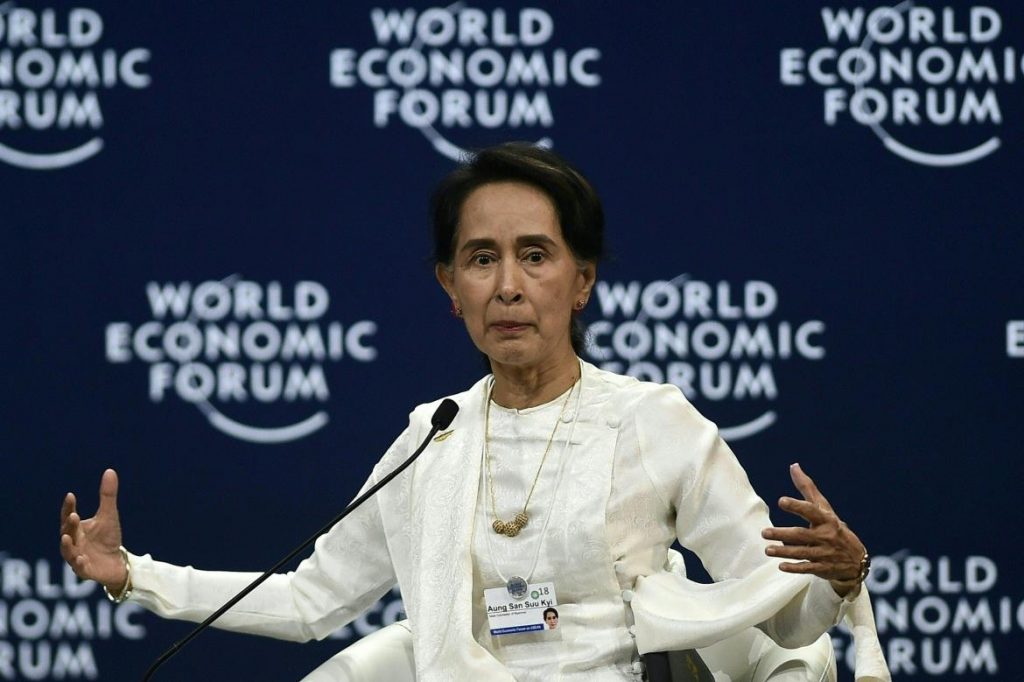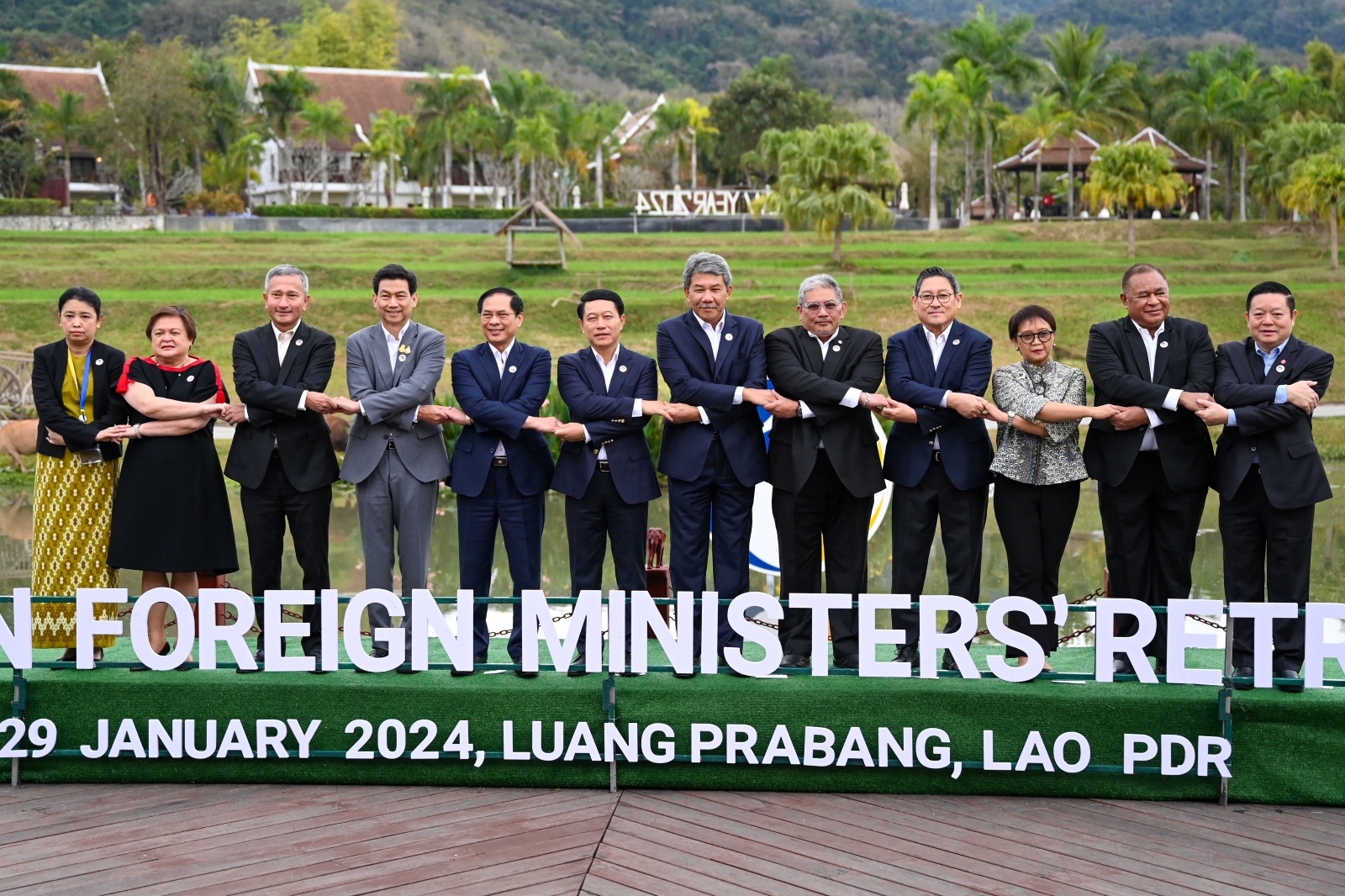By CLARE HAMMOND | FRONTIER
HANOI — Daw Aung San Suu Kyi defended a Yangon court’s decision to jail two Reuters reporters and admitted the Rakhine crisis “could have been handled better” in an onstage interview at the World Economic Forum on ASEAN that also addressed investment and the potential for constitutional change.
Ko Wa Lone and Ko Kyaw Soe Oo were each sentenced to seven years’ imprisonment earlier this month for breaking the Official Secrets Act while reporting on atrocities committed by the military last year in Rakhine State. The verdict elicited international outrage as an attack on media freedom.
“The judgment … had nothing to do with freedom of expression at all,” Myanmar State Counsellor Aung San Suu Kyi said on Thursday at the regional forum in the Vietnamese capital Hanoi.
She added, “they were not jailed because they were journalists, they were jailed because the court decided that they had broken the Official Secrets Act.”
Support more independent journalism like this. Sign up to be a Frontier member.
In her first public comments on the case since the verdict, she said she doubted that anyone had “actually bothered to read” the judgment and called on critics to “point out where they think there has been a miscarriage of justice”. The rule of law was upheld and the pair will have a chance to appeal, she said.
The forum, lasting September 11-13, has convened political and business leaders to discuss the challenges and opportunities facing countries belonging to the Association of Southeast Asian Nations, or ASEAN.
‘With hindsight’
The United Nations said on Tuesday that Myanmar is conducting a “political campaign” against independent journalism and criticized the “failure of the judiciary to uphold the fair trial rights of those targeted,” including Wa Lone and Kyaw Soe Oo.
Aung San Suu Kyi also addressed the military crackdown in Rakhine last year, which sent some 700,000 Rohingya Muslims fleeing to Bangladesh in a campaign that a United Nations Fact-Finding Mission has said may amount to genocide.
“There are of course ways in which we, with hindsight, might think the situation could have been handled better,” she said, adding that the government accepted full responsibility for the political aspects of the crisis.
She failed to address international condemnation, however, focusing additional comments instead on what she said was the obligation on her government to protect “very small ethnic groups [in Rakhine] which are fast disappearing … even if the rest of the world is not interested”.
Aung San Suu Kyi also reiterated her intention to amend the constitutional requirement that unelected members of the military must hold 25 percent of parliamentary seats, but said that in the interests of “national reconciliation and stability” she would pursue this through negotiation.
“There were some people who recommended amending the constitution on the streets, going out and having demonstrations and starting a movement that would force a change in the constitution, but this has never been part of the policy of the NLD [National League for Democracy],” she said.
“Very few people realise that during our 30 years as a political party we have not once organised a public demonstration. We have tried to do everything within the framework of the law.”
Phil Robertson, deputy Asia director of advocacy group Human Rights Watch, said in an emailed statement that Aung San Suu Kyi had “got it all wrong” by defending the sentencing of the Reuters journalists on “rule of law” grounds.
“She fails to understand that real ‘rule of law’ means respect for evidence presented in court, actions brought based on clearly defined and proportionate laws, and independence of the judiciary from influence by the government or security forces,” he said.
“On all these counts, the trial of the Reuters journalists failed the test.”
‘Come to Myanmar and invest’
Of the Myanmar businesspeople in attendance at this year’s World Economic Forum, some applauded Aung San Suu Kyi’s comments, while others said it was a missed opportunity to promote investment opportunities.
“We really want her to focus more on business, because this is a good opportunity to tell the world they should come to Myanmar and invest, especially in Rakhine State,” U Htun Htun Naing, president of the Myanmar Young Entrepreneurs Association told Frontier.
“She herself should invite them and then strongly develop this area. It’s very simple, if business is successful, everybody is prosperous, then there is no more fighting and no more conflict.”
Aung San Suu Kyi touched on investment in Thursday’s interview, and in comments on stage with other ASEAN leaders on Wednesday, saying that Myanmar welcomed competition.
She called for investment into education and agriculture, saying on Thursday she hoped Myanmar could eventually become an agri-based industrialised economy.
Tun Thura Thet of Myanmar Information Technology praised Aung San Suu Kyi’s responses to what he said were challenging questions. “We can’t conveniently blame one side or the other. In fact, there are many sides,” he said.
But he also said he wished Aung San Suu Kyi had talked more about investment, “especially to Rakhine State”.
“That would give a message to the world that we have nothing to hide and if there are problems we will fix them together,” he said. “I think we should provide more access to information and then there would be less misunderstanding.”







